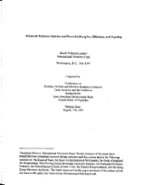Wholesale Payments Systems and Financial Discipline, Efficiency, and Liquidity
Date issued
Jul 1997
Subject
Financial Crisis and Structural Adjustement;
Financial Sector
Category
Working Papers
The experience of a large number of countries since the mid-1970s has demonstrated the limited potential for activist monetary and fiscal policies to influence real macroeconomic performance on a sustained basis. Given the central role of the financial sector in pricing and allocating capital and risk, attention has focused on the architecture of this sector. Heading the reform agenda now are issues pertaining to the relation between the central bank, commercial banks and the wholesale payments system, the financial supervisory and regulatory environment, the development of capital markets, pension reforms, and risk management. This paper considers the lessons that are emerging from payments system reform currently underway in some major industrial countries.
Generative AI enabled




